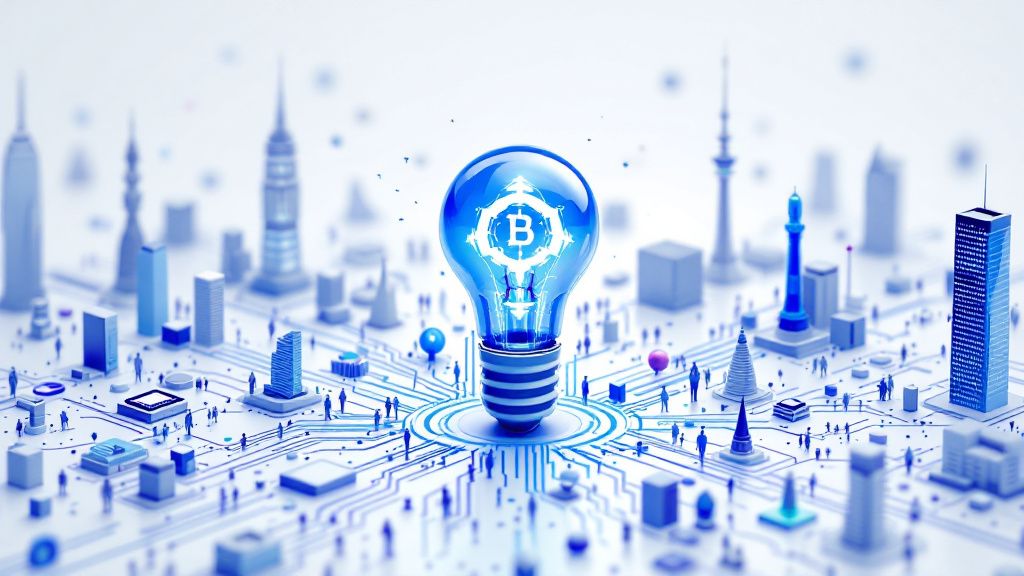Unraveling the Power of Decentralization
Decentralization is transforming how systems operate by distributing authority and decision-making across a broader network, rather than concentrating control in a singular entity. You become part of a decentralized network where you can engage directly without intermediaries, making interactions more efficient and transparent. This innovative approach is most evident in technologies like decentralization in blockchain, which eliminates the need for central banks in digital transactions, empowering you to manage your financial assets more freely through decentralized finance. This shift not only enhances security and transparency but also encourages innovation and inclusivity, offering you new opportunities for growth and participation.

Understanding Decentralization
Decentralization reshapes the traditional frameworks by empowering individuals with more control and transparency. Historically, the concept gained momentum during the internet's rise in the late 20th century, offering a foundation for an open and accessible digital landscape. Fast forward to today, decentralization in blockchain has captured significant attention. By allowing you to conduct secure transactions without intermediaries, it introduces a new era of trustless systems. In decentralized finance, you have the opportunity to explore financial services without the constraints imposed by conventional institutions, crafting a more inclusive and equitable financial system for all.
Tracing its evolution from the early days of the internet, decentralization has fueled continuous innovation in technology and finance. You experience its benefits through decentralized networks that foster collaboration, allowing diverse nodes to contribute to the system's resilience and robustness. This environment encourages a democratic approach to data sharing and governance, where everyone's input is valued. As a participant, you not only embrace the freedom of managing your own assets and information but also contribute to a more dynamic and responsive digital ecosystem, paving the way for future advancements in various sectors.

Historical Perspective
Decentralization has deep historical roots dating back to ancient times when communities operated under collective decision-making. The Middle Ages saw decentralized forms in guilds and trade associations, which functioned independently of central authority. These early models laid the groundwork for modern decentralized systems you find today, emphasizing community input and shared governance rather than singular control.
The digital era witnessed a profound evolution in decentralization, especially with the inception of the internet. It started as a decentralized network designed to withstand disruptions by distributing information across multiple locations. This laid the foundation for today’s decentralized networks in technology, offering you the ability to connect and collaborate without centralized oversight.
To truly understand decentralization, you need to shift your mindset from accepting centralized control to embracing a more participatory and distributed approach. This new perspective highlights the possibilities introduced by decentralization in blockchain and decentralized finance, where control is democratized, giving you more autonomy and security. The result is a transformative impact on how you perceive and engage with digital ecosystems.
Corporate and Organizational Decentralization
Corporate and organizational decentralization involves transitioning from a centralized hierarchy to a more distributed model that empowers various branches or teams within a company. This approach allows you to experience improved adaptability and innovation, fostering an environment where decisions can be made closer to the point of impact. It enables organizations to respond quickly to changes, thereby enhancing customer satisfaction and employee engagement.
In your workplace, decentralization can manifest as the delegation of authority to specific teams or regional offices, thereby allowing them to tailor their decision-making processes to local needs. This can lead to a more efficient allocation of resources and more creative problem-solving. You benefit from a more agile organization that can leverage the diverse insights and expertise of its components for greater success.
What most people don’t see about corporate decentralization is the collaborative synergy behind the scenes that makes all the difference. By shifting some power from the top executives to those on the front lines, companies can tap into a wealth of untapped creativity and passion. This restructuring aligns with the broader trends seen in decentralized finance and decentralization in blockchain, showing how empowering smaller units within a structure can lead to transformative outcomes.
Decentralization in Technology
How does decentralization reshape the technological landscape and impact your everyday digital interactions? In the realm of technology, decentralization is a powerful shift, moving away from centralized servers and entities to a more distributed model. This transition affects how data is managed and shared, offering you enhanced privacy and security. With decentralized systems, there's no single point of failure, making them more resilient against attacks and downtimes.
Decentralization in blockchain epitomizes this transformation by providing a secure framework for transactions and data storage. Unlike traditional systems, where your data passes through a central authority, blockchain technology empowers you to control your transactions directly on a decentralized network. Each block in the network carries information that is immutable and transparent, ensuring trust among participants.
In terms of application, decentralized networks are altering the way you engage with technology, from everyday applications to complex processes. By enabling peer-to-peer interactions, decentralized networks eliminate intermediaries that often accompany traditional systems. This not only enhances efficiency but also reduces costs, giving you more direct control over digital exchanges.
Decentralized finance takes this model further by bringing banking services directly to you without traditional banking infrastructures. With decentralized finance, you can access loans, savings, and investments in a streamlined manner, all thanks to smart contracts and blockchain technology. This financial innovation creates opportunities for you to participate in the global economy without conventional barriers.
This technological decentralization supports a more open and inclusive environment, aligning with your personal needs and preferences. It reflects the broader trend of democratizing information and resources, allowing you a greater say in digital spaces. The ongoing exploration and implementation of decentralized technologies promise new dimensions of creativity, innovation, and personal empowerment.
Impact on Governance
Decentralization brings a transformative impact on governance by redistributing decision-making power, fostering more inclusive and transparent systems. In a decentralized governance model, you find that decisions are pushed down to the level where they are most relevant. This change gives citizens more direct influence over policies affecting their lives, thus enhancing democratic engagement and accountability.
One unpopular opinion about decentralization in governance is that it might lead to inefficiencies and fragmented policies. Critics argue that without a central authority coordinating efforts, there can be a lack of cohesion in implementing large-scale initiatives. However, this viewpoint often underestimates the potential of localized governance solutions to tailor their actions to the unique needs and priorities of their constituents.
Decentralization in blockchain projects extends to governance through Decentralized Autonomous Organizations (DAOs). These entities operate based on smart contracts that execute decisions based on community votes. As a participant in such a system, you have the opportunity to propose and vote on changes, making governance more participatory and transparent.
In decentralized finance, similar governance mechanisms can impact how platforms and protocols evolve over time. You can contribute to decision-making processes, shaping the features and direction of financial services you rely on. This level of involvement ensures that financial platforms are more in tune with the diverse needs of their users, potentially leading to better collective outcomes.
The shift towards decentralized governance reflects a broader change in how authority is viewed and exercised. It allows for more tailored and responsive governance that can adapt to rapid social and technological changes. As you engage with decentralized systems, you help drive the momentum towards more open, accountable, and dynamic methods of governance.

Decentralization in Supply Chains
Decentralization in supply chains is changing the way goods and services are produced and delivered. By eliminating bottlenecks and distributing control across various points, you witness more resilient and transparent operations. This transformation enables faster reaction times to disruptions, creating a supply chain that's not only efficient but also adaptable to unexpected challenges and opportunities.
Blockchain technology plays a crucial role in this evolution by providing a secure and transparent ledger that tracks products from origin to destination. This ensures that you receive goods with verified authenticity and integrity. Each step documented in the blockchain enhances traceability, which is vital for industries like food and pharmaceuticals where transparency is key to safety and quality assurance.
To make the most of decentralized supply chains, try incorporating local suppliers and diversifying your sources. This strategy increases flexibility and reduces dependency on any single source. You gain the advantage of being able to pivot quickly and maintain continuity, even when specific parts of the supply chain encounter issues, ultimately leading to more robust and reliable operations.


.jpg)

.jpg)
.webp)
.webp)
.webp)


.svg)









